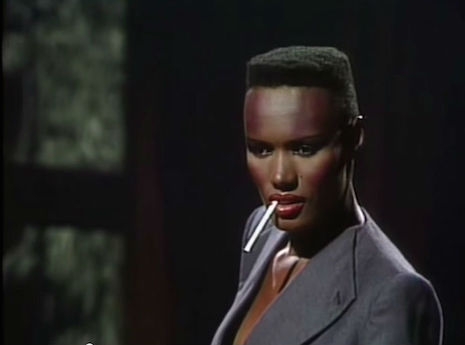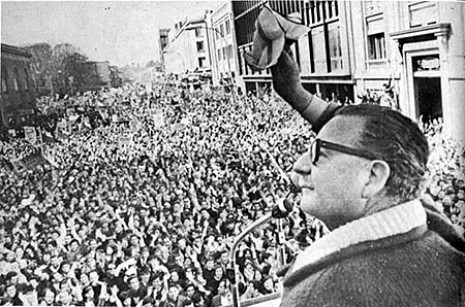
Only Grace Jones would look at home in a blue/teal/peach bodysuit and purple ponytail…. You can’t beat it.
Grace Jones is such a likable presence that any random 44 minutes of her life would, we can presume, be tolerably diverting. Even better when it’s a pristine chunk of her performing on Chilean TV right smack in her prime. This marvelous footage popped up on YouTube in December but hasn’t gotten the play it deserves (yet). Considering that the clip is roughly 35 years old, to my eyes and ears both the audio and video fidelity seem extraordinarily high.
The setting is some kind of swank eatery/studio, there are tables with well-heeled patrons enjoying food and drink. Quite a distance from, say, sweaty and chaotic Studio 54, n’est-ce pas? During the first number, “The Hunter Gets Captured by the Game,” off of 1980’s Warm Leatherette, Grace briefly attacks a potted plant (an incident that, judging from this playful clip, got more than its share of attention in South America) and ends the song by hovering over a table full of patrons.

During the interview segment, conducted mostly in Spanish, we learn that Grace was under the weather that day. It didn’t prevent her from shedding a tear or two during “Ma Vie en Rose.” During the jaunty track “Bullshit” she gets on a table and boogies down.
This whole clip is crazy entertaining, but if you’re in a rush, it’s still worth it just for the stunning multicolored bodysuit and synthetic purple ponytail she wears for the first song. (After a costume change, she re-emerges in a more familiar mannish gray jacket.)
Track listing:
The Hunter Gets Captured by the Game
La Vie en Rose
Bullshit
Fame
Autumn Leaves






